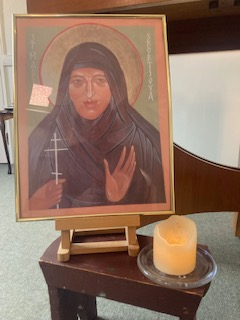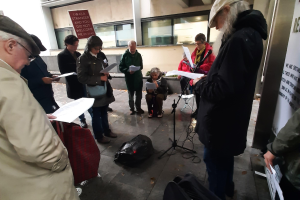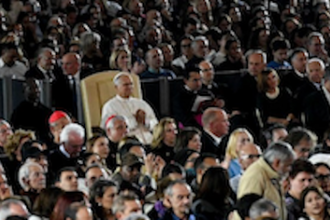Br Johannes Maertens reflection during Home Office Vigil

Br Johannes Maertens gave this reflection on Monday at the Prayer Vigil outside the Home Office for refugees who have died trying to reach asylum in Britain.
Reading: Luke 10:25-37
This year marks 80 years since the death of Mother Maria Skobtsova. The Church Times recently referred to her as an "eccentric, chain-smoking poet, monastic, and martyr" "whose theology-grounded in the dual command to love both God and neighbour"-remains startlingly relevant. And perhaps more urgently needed than ever.
In recent years, certain voices-some from pulpits, some from platforms of global influence-have begun to portray empathy as a liability. In 2018, an American pastor published a book titled The Sin of Empathy, describing compassion as potentially morally dangerous. Others have called mercy weak. More recently, tech billionaire Elon Musk described empathy as the "fundamental weakness of Western civilisation," even criticising Germany's funding of refugee rescue efforts in the Mediterranean. In response, Germany's Foreign Office simply said: "Yes. And it's called saving lives."
Compassion, empathy… What most of us would consider a fundamental strength-a binding force in our cultures-is now labeled a threat by those in power. And these are not random comments. They are part of a wider push to redefine the moral imagination of society.
But contrast that with the Gospel- and our Gospel reading today -and the very life of Mother Maria Skobtsova.
The parable of the Good Samaritan reframes what it means to be a neighbour-not by nationality, proximity, or religious allegiance, but by mercy. "Who was neighbour to the man?" Jesus asks. And the answer is clear: "The one who showed him compassion." Jesus, doesn't answer the question "Who is your neighbour" - he tells you more how you would hope your neighbour is - and then Jesus says: "Go and do likewise."
This command sits at the heart of Mother Maria Skobtsova's radical theology. What she called "the sacrament of the brother." She wrote: "Give from the heart, since each person is the very icon of God incarnate in the world."
Let that sink in. Every human being-no matter how broken or marginalised-is an icon of Christ. For Mother Skobtsova, every encounter with another person becomes a kind of opportunity to be liturgy. She imagined the whole world as one altar. And to this altar, we offer not only bread and wine, but our hearts-so that they might be transformed into Christ's love. A "kenotic love"-a love that empties itself.
In this vision, compassion is not weakness. It is sacrament.
Mercy is not naive. It is resurrection.
She didn't separate the altar from the street, the Eucharist from the soup kitchen, or the refugee-boats from the chalice. She saw Christ there-broken, waiting-and she responded.
When the Nazis invaded Paris, Mother Maria didn't ask whether hiding Jewish children was politically wise. She saw the face of Christ and acted. And it cost her everything, she died in the Ravenbrouck concentration camp, where she was gazed to death around Easter 1945.
So we must ask: what do we see today?
Across the Mediterranean, in the English Channel, across borders, people are crossing treacherous waters in small inflatable boats. Fleeing war, persecution, and poverty. They too lie wounded along the road to Jericho. And we-we are the passers-by. The priests. The Levites.
We scroll past their faces. Hear their statistics. Debate their fate. But the Gospel doesn't ask who deserves to be saved.
It asks: Who will show compassion?
To offer mercy is to meet Christ.
To bind a wound is to celebrate Eucharist.
To open a door is to open heaven.
This is not sentimental. It is spiritual courage.
So when we see a migrant in crisis, a stranger at the door, an outcast in pain-we must not pass by. We must be moved with compassion. Not because it's trendy, or convenient. But because Christ is there.
Broken. Waiting.
And that is why we stand here today.
In prayer. In solidarity.
And in hope-for a more compassionate future, together.
Amen.
"But if at the center of the Church's life there is this self-giving Eucharistic love, then where are the Church's boundaries, where is the periphery of this center? Here it is possible to speak of the whole of Christianity as an eternal offering of a Divine Liturgy beyond church walls ... It means that we must offer the bloodless sacrifice, the sacrifice of self-surrendering love not only in a specific place, upon the altar of a particular temple; the whole world becomes the single altar of a single temple, and for this universal liturgy we must offer our hearts, like bread and wine, in order that they may be transformed into Christ's love, that he may be born in them, that they may become "God-manly" hearts, and that He may give these hearts of ours as food for the world…" " (Mother Maria Skobtsova, Selected Writings, ed. Jim Forest, Chapter on Types of Monasticism, page 185.)
NOTE: A Christian Service of Remembrance for those who have died during the war in Gaza will take place at the Foreign Office in King Charles Street, London, SW1A 2AH on Monday, 28 July, 12.30pm -1.30pm
For more details see: www.indcatholicnews.com/news/52775


















